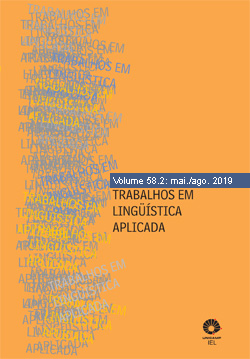Abstract
Contemporary dystopia has distinguished itself from the canonic texts of the genre since it has problematized technology and is permeated by posthumanism. This update in the dystopian genre has a utopic subtext within the narrative. In it, utopia is only achieved by a return to nature; such a connection between humanity and nature will only be restored by the feminine who will work as a bridge to a posthuman relation among species. This paper will start from the contributions of Derrida (1997, 2008), Dunja M. Mohr (2007), Rita Terezinha Schmidt (2017) and Cary Wolfe (2009) to analyze the trilogy Hunger Games (2008, 2009, 2010), aiming to discuss epistemologically the utopic subtext. The paper will show that Rue and Katniss will create a strong bond with nature, being the last female character responsible to lead society to a posthuman utopic place.
References
ALAIMO, Stacy. Exposed: Environmental Politics and Pleasures in Posthuman Times. Minneapolis: University of Minnesota Press, 2016.
ATWOOD, Margaret. In other words: sf and human imagination. New York: Doubleday, 2011.
BACCOLINI, Raffaella( 2004). The Persistence of Hope in Dystopian Science Fiction, PMLA, Florianópolis, vol. 119, No. 3, p. 518-521.
BEAUVOIR, Simone de (1949). The second sex. Translated by: Constance Borde; Sheila Molovany-Chevallier. New York:Vintage books, 2010.
CHODOROW, Nancy. The Reproduction of Mothering: Psychoanalysis and the Sociology of Gender. Los Angeles: University of California Press, 1978.
COLEBROOK, Claire. Death of the PostHuman: Essays on Extinction. Michigan: Open Humanities Press, 2014.
COLLINS, Suzanne. The Hunger Games. 1 ed. New York: Scholastic Press, 2008.
COLLINS, Suzanne. Catching Fire. 1 ed. New York: Scholastic Press, 2009.
COLLINS, Suzanne. Mockingjay. 1 ed. New York: Scholastic Press, 2010.
DAY, Sara K.; GREEN-BARTEET, Miranda A.; MONTZ, Amy L.. Female Rebellion in Young Adult Dystopian Fiction. Burlington: Ashgate Publishing Company, 2014.
DERRIDA, Jacques (1976). Of Grammatology. Baltimore: The Johns Hopkins University Press, 1997.
DERRIDA, Jacques. The animal, therefore I am. New York: Fordham University Press, 2008.
GRIFFIN, Susan (1978). Woman and Nature: The Roaring Inside Her. New York: Open Road, 2015.
HANEY, William S. Cyberculture, Cyborgs and Science Fiction: Conciousness and the Posthuman. Nova Your: Rodopi, 2005.
HAYLES, N. Katherine. How We Became Posthuman: Virtual Bodies in Cybernetics, Literature, and Informatics. Chicago: The university of Chicago Press, 1999.
HINTON, Susan E. The outsiders. New York: Viking Press, 1967.
MARKS DE MARQUES, Eduardo (2013). “‘God is a cluster of neurons’: Neo-posthumanism, theocide, theogony and anti-myths of origin in Margaret Atwood’s Oryx and Crake”. Gragoatá, Niterói, n. 35, p. 155-169.
MOHR, Dunja M(2007). “Transgressive Utopian Dystopias: The Postmodern Reappearance of Utopia in the Disguise of Dystopia”. Zeitschriftfür Anglistik und Amerikanistik (ZAA), Vol. 55, No. 1, p. 5-24.
MOHR, Dunja M . (2017). ““Anthropocene Fiction: Narrating the ‘Zero Hour’ in Margaret Atwood’s MaddAddam Trilogy”. In: MATHIS-MOSER, Ursula; CARRIÈRE, Marie (ed.). Writing Beyond the End Times?: The Literatures of Canada and Quebec. Innsbruck: Innsbruck UP, p. 25-46.
PEPPEREL, Robert. The Posthuman Condition Consciousness beyond the brain. Oregon: Intellect Books, 2003.
SARGENT, Lymar Tower. Utopia: A very short introduction. New York: Oxford, 2010.
SCHMIDT, Rita T. Decentramentos/Convergências: Ensaios de Crítica Feminista. Porto Alegre: Editora da UFRGS, 2017.
WATERS, Brent. From Human to Posthuman: Christian Theology and Technology in a
Postmodern World. Burlington: Ashgate, 2006.
WOLFE, Cary. Animal Rites: American Culture, the Discourse of Species, and Posthumanist Theory. Chicago: The University of Chicago Press, 2003a.
WOLFE, Cary. Before the Law: Humans and Other Animals in a Biopolitical Frame. Chicago: The University of Chicago Press, 2013.
WOLFE, Cary. What is Posthumanism?. Minneapolis: University of Minnesota Press, 2010.
WOLFE, Cary. Zoontologies: the question of the animal. Minneapolis: University of Minnesota Press, 2003b.
O periódico Trabalhos em Linguística Aplicada utiliza a licença do Creative Commons (CC), preservando assim, a integridade dos artigos em ambiente de acesso aberto, em que:
- A publicação se reserva o direito de efetuar, nos originais, alterações de ordem normativa, ortográfica e gramatical, com vistas a manter o padrão culto da língua, respeitando, porém, o estilo dos autores;
- Os originais não serão devolvidos aos autores;
- Os autores mantêm os direitos totais sobre seus trabalhos publicados na Trabalhos de Linguística Aplicada, ficando sua reimpressão total ou parcial, depósito ou republicação sujeita à indicação de primeira publicação na revista, por meio da licença CC-BY;
- Deve ser consignada a fonte de publicação original;
- As opiniões emitidas pelos autores dos artigos são de sua exclusiva responsabilidade.


